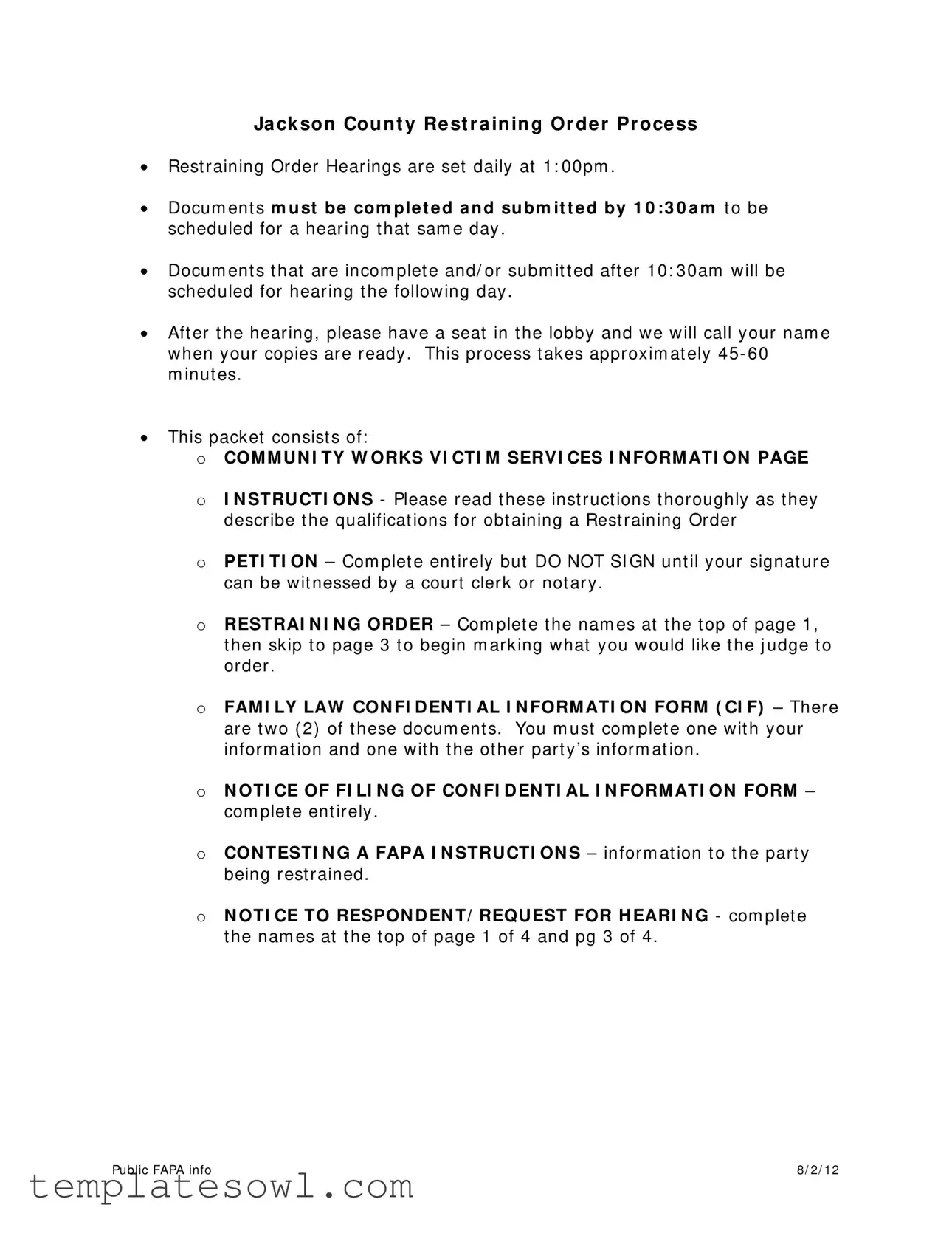Fill Out Your Jackson County Courthouse Restraining Order Form
The process of obtaining a restraining order at the Jackson County Courthouse is designed to help individuals protect themselves from potential harm. Restraining order hearings are scheduled daily at 1:00 PM, but it is crucial that all necessary documents are completed and submitted by 10:30 AM for same-day hearings. Those who arrive after this deadline will have to wait until the following day. After attending the hearing, individuals will need to remain in the lobby, as copies of their orders will be provided within approximately 45 to 60 minutes. The restraining order packet includes several important documents. The Victims Services Information page outlines qualification requirements to obtain a restraining order, while the petition forms require careful completion. It’s important to remember not to sign these forms until a court clerk or notary can witness the signature. Confidential information must be protected by using designated forms. This process recognizes the sensitivities surrounding domestic issues, allowing for a focused approach to ensure safety. Community advocates are available to assist in navigating this process, offering support and guidance throughout. Together, these measures strive to make a challenging situation a little more manageable, ensuring victims have access to vital resources and protections during an otherwise daunting experience.
Jackson County Courthouse Restraining Order Example
Ja ck son Cou n t y Re st r a in in g Or d e r Pr oce ss
• Rest r aining Or der Hear ings ar e set daily at 1: 00pm .
•Docum ent s m u st be com ple t e d a n d su bm it t e d by 1 0 :3 0 a m t o be
scheduled for a hear ing t hat sam e day .
•Docum ent s t hat ar e incom plet e and/ or subm it t ed aft er 10: 30am w ill be scheduled for hear ing t he follow ing day .
• Aft er t he hear ing, please hav e a seat in t he lobby and w e w ill call y our nam e w hen y our copies ar e r eady . This pr ocess t ak es appr ox im at ely 45 - 60
m inut es.
•This pack et consist s of:
OCOM M U N I TY W ORKS V I CTI M SERV I CES I N FORM ATI ON PAGE
OI N STRU CTI ON S - Please r ead t hese inst r uct ions t hor oughly as t hey
descr ibe t he qualificat ions for obt aining a Rest r aining Or der
OPETI TI ON – Com plet e ent ir ely but DO NOT SI GN unt il y our signat ur e can be w it nessed by a cour t cler k or not ar y .
O RESTRAI N I N G ORD ER – Com plet e t he nam es at t he t op of page 1,
t hen sk ip t o page 3 t o begin m ar k ing w hat y ou w ould lik e t he j udge t o or der .
OFAM I LY LAW CON FI D EN TI AL I N FORM ATI ON FORM ( CI F) – Ther e
ar e t w o ( 2) of t hese docum ent s. You m ust com plet e one w it h y our infor m at ion and one w it h t he ot her par t y ’s infor m at ion .
ON OTI CE OF FI LI N G OF CON FI D EN TI AL I N FORM ATI ON FORM – com plet e ent ir ely .
OCON TESTI N G A FAPA I N STRUCTI ON S – infor m at ion t o t he par t y being r est r ained.
ON OTI CE TO RESPON D EN T/ REQUEST FOR H EARI N G - com plet e t he nam es at t he t op of page 1 of 4 and pg 3 of 4 .
Public FAPA info |
8/ 2/ 12 |

Community Works Victim Services
Court Advocate’s Office
100 South Oakdale, Rm. 325
Medford, Oregon 97501
24/7 Crisis and Information Line: HelpLine
If you are a victim seeking support and help with a protective order, the Community Works Court Advocates can help. Our services are free and confidential. The Community Works Court Advocate’s Office provides comprehensive advocacy to individuals victimized by domestic violence, sexual assault and stalking. Spanish speaking advocates are available and we can assist people who speak most languages.
•The Court Advocates assists victims with information about obtaining and keeping restraining orders.
•The Court Advocates provide information about obtaining stalking orders.
•The Court Advocates provide services to victims, their children, family and friends including educational information, safety planning, emotional support and referrals to needed resources.
•The Court Advocates provide support to victims preparing for court hearings and trials and can sit with victims in hearings and trials to offer support and help in understanding what is taking place.
•The Court Advocates work together with other agencies and service providers to help the victims we serve.
•The Court Advocates provide crisis intervention counseling in person and by phone.
•The Court Advocates facilitate the instruction of the Alternatives to Violence classes for both men and women and the registration for domestic violence survivor support groups throughout the community.

GETTING A FAMILY ABUSE PREVENTION ACT (FAPA)
RESTRAINING ORDER
INSTRUCTIONS
IMPORTANT NOTE
INFORMATION THAT MUST BE KEPT CONFIDENTIAL
You must keep certain information (“confidential personal information”) out of any papers you file or submit to the court and, instead, provide that information in a Confidential Information Form (CIF). “Confidential Personal Information” includes social security number; date of birth; former legal names, driver license numbers; and employer’s name, address, and telephone number. It also applies to information regarding a party or a party’s child. On the pleading or document where that confidential personal information would otherwise appear, you must note that the information has been separately provided under UTCR 2.130.
Relevant Rules and Forms
UTCR 2.130. – Family Law Confidential Information Forms
UTCR Form 2.130.1 – Family Law Confidential Information Form
UTCR Form 2.130.2 – Notice of Filing Confidential Information Form
WHAT IS A RESTRAINING ORDER?
A restraining order is a court order that tells the person who hurt you (the respondent) to leave you and your children alone. It can tell the respondent to move from your home and can deal with temporary custody and parenting time of your children. You can ask the judge to add other orders (listed in the restraining order papers) that you think will help you stay safe. You also can ask the court to include an order that says the respondent cannot have guns. A restraining order can deal with custody and parenting time issues only temporarily. To get “permanent” custody and parenting time orders, you will need to a file a family law case, such as a divorce or a custody case.
WHAT ARE THE REQUIREMENTS FOR GETTING A RESTRAINING ORDER?
1. Age |
You must be at least 18 years old or |
|
You are younger than 18 and the person who abused you is at least 18 and |
• you are (or were) married to that person or
• you have been in a sexual relationship with that person.
2. Relationship The person who abused you is:
• your husband, wife or domestic partner
• your former husband, wife, or domestic partner
• an adult with whom you are living (or did live) in a sexual relationship
• an adult with whom you have been in a sexual relationship in the last two years
• an adult related to you by blood, marriage, or adoption
• the parent of your child
INSTRUCTIONS – OBTAINING A FAPA RESTRAINING ORDER - Page 1 of 4
Public FAPA Instructions Obtain Jackson |
5/24/12 |
3. Abuse |
In the last 180 days*, the person who abused you must have: |
|
• physically injured you or |
|
• tried to physically injure you or |
|
• made you afraid that he or she was about to physically injure you or |
|
• made you have sexual relations against your wishes by using force or threats of |
|
force |
|
(*Any time period when the person who abused you was in jail or lived more than 100 |
|
miles from your home does not count as part of the 180 day period. This means you may |
|
still be able to get a restraining order even if it has been more than 180 days since you were |
|
abused.) |
4.Ongoing You are in danger of more abuse very soon, and the person who abused you is a threat to
Danger |
the physical safety of you or your children. |
NOTE: A judge cannot give you a restraining order solely for threats to take your children, rude behavior, verbal or emotional abuse, or damaged property unless you were in fear that you were about to be physically injured.
WHERE DO I FILE FOR A RESTRAINING ORDER AND HOW MUCH DOES IT COST?
You must file for a restraining order in the courthouse in the county where either you or the respondent live. Getting a restraining order is free.
HOW DO I FILL OUT THE PAPERS TO GET A RESTRAINING ORDER?
Use a blue or black ballpoint pen and write clearly. Answer each question carefully and tell the truth. Do not write in the part of the papers that say “Judge’s Initials”. You will need to sign in front of a notary or court clerk. Bring photo ID. If you need assistance completing the forms, please visit the Community Works Victim Services Court Advocate’s Office on the third floor of the Jackson County Justice Building at 100 S. Oakdale. Advocates and court staff cannot answer legal questions.
WHAT HAPPENS AFTER I FILL OUT THE PAPERS?
You will be scheduled for a hearing at 1:00 pm on either the day you file your forms or the following business day (depending upon what time you filed your forms with the court). The judge may ask you some questions. If the judge gives you the restraining order, court staff will make copies for you. You will need to have one of the copies
WILL ADDITIONAL HEARINGS BE SCHEDULED?
In a few cases, the judge may wait to make a custody order and will set a hearing to get more information about the children from you and the respondent. You must go to that hearing or the order will probably be dismissed (dropped).
Otherwise, the respondent has 30 days from the date of service to request a hearing contesting the restraining order. If the respondent does not request a hearing, the restraining order will stay in effect. After 30 days from the date of service, if the restraining order has not been dismissed, the only type of hearing a party may request is to make changes to custody and/or parenting time, respondent’s removal from the home, respondent’s restrictions from other premises, or contact by the respondent
INSTRUCTIONS – OBTAINING A FAPA RESTRAINING ORDER - Page 2 of 4
Public FAPA Instructions Obtain Jackson |
5/24/12 |
If the respondent does request a hearing, it will be held very quickly. You may have as little as two days to get ready to go to the hearing. If the hearing is scheduled more than a few days away, the court will send you notice of the time and date of the hearing in the mail. If there is not enough time to mail you a notice, the court may contact you by telephone. Be sure the court always has your current contact addresses and contact phone numbers so you get notice of any hearing. You also can call the court to check to see if a hearing has been set.
You must go to the hearing or the order will probably be dropped. If you cannot go to the hearing due to an emergency, call the court clerk right away. It may be helpful to have an attorney represent you at the hearing, but it is not required.
WHAT HAPPENS AT THE HEARING REQUESTED BY THE RESPONDENT?
The purpose of the hearing is to decide whether or not the restraining order will remain in effect, and if it does remain in effect, if the order will stay the same or change in some way. The judge may decide not to change the order even if both sides agree that they want the same changes.
At the hearing, you must prove that you have been abused and that you are in danger of further abuse. You should be ready to give your own testimony, call witnesses, and give the judge any evidence you have (such as photos of your injuries). In some cases, if the restraining order stays in effect, it will be against the law for the respondent to have guns. If you are worried about your safety, you may ask for a sheriff’s deputy to be present in the courtroom.
HOW LONG DOES A RESTRAINING ORDER LAST?
A restraining order lasts for one year from the date the judge signed it or until a judge orders it cancelled. It can be renewed for one year at a time, if the judge believes you are likely still in danger. To renew the order, you must file the court paperwork before the order ends.
WHAT CAN I DO IF THE RESPONDENT VIOLATES (DOES NOT FOLLOW) THE RESTRAINING ORDER?
You can call the police. The officer must arrest the respondent if there is a good reason to believe a violation has happened. The respondent can be charged with contempt of court. If found guilty of contempt, the respondent can be fined, placed on probation, or put in jail. It is best that you carry a copy of the restraining order with you at all times and that you not contact the other party. A restraining order does not guarantee your safety. You can take other steps to stay safe. A domestic violence or sexual assault program can help.
For information regarding domestic violence resources, please visit our website. http://courts.oregon.gov/OJD/OSCA/cpsd/courtimprovement/familylaw/domesticviolence.page?
WHAT IF I WANT TO DROP THE RESTRAINING ORDER?
After taking the Alternatives to Violence class, you must file papers at the courthouse to ask the judge to drop the order. The order remains in effect until the judge dismisses it. It may take a few days for law enforcement to get notice of the dismissal. Contact the Community Works Victim Services at
INSTRUCTIONS – OBTAINING A FAPA RESTRAINING ORDER - Page 3 of 4
Public FAPA Instructions Obtain Jackson |
5/24/12 |
CAN THE RESTRAINING ORDER BE CHANGED WHILE IT IS IN EFFECT?
At any time after a restraining order has been entered, you may request that the court modify, remove, or make less restrictive those terms involving custody and parenting time, respondent’s removal from the house, respondent’s restrictions from other premises, or contact by the respondent
DO I NEED A LAWYER?
If you have questions about how the law works or what it means, you may need to talk to a lawyer. You are not required to have a lawyer to obtain the restraining order, but you can have a lawyer represent or help you if you wish. If you need help finding a lawyer, you may call the Oregon State Bar’s Lawyer Referral Service at 503.684.3763 or 800.452.7636. The Center for
WHAT IF I NEED AN ACCOMMODATION OR AN INTERPRETER?
If you have a disability and need an accommodation, or you are unable to speak English and need a foreign language interpreter, you must tell the court as soon as possible, but at least four days before your hearing. Tell the clerk that you have a disability and what type of assistance you need or prefer, or which language you speak.
INSTRUCTIONS – OBTAINING A FAPA RESTRAINING ORDER - Page 4 of 4
Public FAPA Instructions Obtain Jackson |
5/24/12 |

IN THE CIRCUIT COURT OF THE STATE OF OREGON
COUNTY OF JACKSON
|
|
|
|
|
) |
|
|
|
|
|
|
See CIF |
) |
Case No. |
|
|
|
Petitioner (your full name) |
(date of birth) ) |
|
|
|
||||
|
|
|
|
|
) |
PETITION FOR RESTRAINING ORDER |
||
v. |
|
|
|
) |
TO PREVENT ABUSE |
|||
|
|
|
|
|
) |
(Family Abuse Prevention Act) |
||
|
|
|
|
|
) |
ORS 107.700 – 107.735 |
||
|
|
|
See CIF |
|
) |
|
|
|
Respondent |
(date of birth) ) |
|
|
|
||||
(full name of person restrained). |
|
|
|
) |
|
|
|
|
NOTICE TO PETITIONER
You must provide complete and truthful information. If you do not, the court may dismiss any restraining order and may also hold you in contempt.
Contact Address and Telephone Number: If you wish to have your residential address or telephone number withheld from Respondent, use a contact address and telephone number so the court and the sheriff can reach you if necessary.
NOTICE TO PETITIONER
You must keep certain information (“confidential personal information”) out of any papers you file or submit to the court and, instead, provide that information in a Confidential Information Form (CIF). On this document, where that confidential personal information would otherwise appear, you must provide that in a Confidential Information Form (CIF) under UTCR 2.130 (see instructions).
I am the Petitioner and I state that the following information is true:
I am a resident of |
|
|
|
|
|
County, Oregon. I am |
|
|
years old. |
||||
Respondent is a resident of |
|
|
|
County, State of |
. |
||||||||
Respondent is |
|
|
years old. |
|
|
|
|
|
|
|
|
||
At the hearing, I will need an interpreter in the |
|
|
|
|
|
language. |
|||||||
At the hearing, I will need American’s with Disabilities Act accommodations.
1. CHECK and FILL OUT ALL THAT APPLY:
A. Respondent is my spouse/domestic partner former spouse/domestic partner. We were
married/registered on |
|
|
(date). Our marriage/partnership was dissolved on |
|
|
(date). |
|
B. Respondent and I are adults related by blood, marriage, or adoption. Respondent is my (type of relationship).
C. Respondent and I have been cohabiting (living together in a sexually intimate relationship) since
(date), or cohabited from |
|
(date) to |
|
(date). |
D. Respondent and I have been involved in a sexually intimate relationship within the last two years.
E. Respondent and I are the unmarried parents of a child.
F. I am a minor and have been involved in a sexually intimate relationship with Respondent, who is 18 years of age or older.
PETITION FOR RESTRAINING ORDER TO PREVENT ABUSE - Page 1 of 6
(FAPA 3/10)

2.WITHIN THE LAST 180 DAYS**, RESPONDENT HAS (check all that apply):
A. Caused me bodily injury.
B. Attempted to cause me bodily injury.
C. Placed me in fear of imminent bodily injury.
D. Caused me to engage in involuntary sexual relations by force or threat of force
**THE 180 DAY PERIOD CAN BE INCREASED BY THE AMOUNT OF TIME RESPONDENT WAS IN JAIL, IN PRISON, OR LIVED MORE THAN 100 MILES FROM YOUR HOME:
The Respondent was incarcerated from |
|
to |
|
. |
The Respondent lived more than 100 miles from my home from
to(date).
3.DESCRIBE THE INCIDENT(S) OF ABUSE THAT HAPPENED IN THE LAST 180 DAYS: Describe how Respondent hurt or threatened to hurt you, starting with the most recent incident:
Date:,County/State::
Date: |
|
, County/State: |
: |
|
|
|
|
|
|
|
|
|
|
|
|
|
|
|
|
|
|
|
|
|
|
|
|
|
|
|
|
|
|
|
|
|
|
|
|
|
|
Date: |
, County/State: |
: |
|
||
|
|
|
|
|
|
|
|
|
|
|
|
|
|
|
|
|
|
|
|
|
|
|
|
|
|
|
|
|
|
|
|
|
|
|
|
Additional pages attached labeled “Paragraph 3: Description of Abuse”
PETITION FOR RESTRAINING ORDER TO PREVENT ABUSE - Page 2 of 6
Public FAPA Petition Jackson |
5/24/12 |

4.Are there incidents other than those described above in which the Respondent has hurt or threatened to hurt you before the 180 day period above? If yes, explain:
Describe how Respondent hurt or threatened to hurt you, starting with the most recent incident:
Date: |
|
, County/State: |
: |
|
|
|
|
|
|
|
|
|
|
|
|
|
|
Date: |
|
, County/State: |
: |
|
|
|
|
|
|
|
|
|
|
|
|
|
|
Date: |
|
, County/State: |
: |
|
|
|
|
|
|
|
|
|
|
|
|
|
|
Additional pages attached labeled “Paragraph 4: Additional Abuse”
5.I am in imminent danger of further abuse by Respondent and the Respondent is a threat to my physical safety or the physical safety of my child/ren because:
6.IN ANY OF THE ABOVE INCIDENTS OR OTHER INCIDENTS OF ABUSE: A. Were you injured? Yes No Describe:
B. Did you seek medical treatment? Yes No Describe:
C. Were weapons involved? Yes No Describe:
D. Were drugs or alcohol involved? Yes No Describe:
E. Were the police called? Yes No Who was arrested?
7. The Respondent has access to firearms now, or I am concerned about his/her getting firearms.
I want the Respondent ordered not to possess or purchase firearms or ammunition because (explain how your and/or your children’s safety and welfare are affected by Respondent’s possession of firearms):
PETITION FOR RESTRAINING ORDER TO PREVENT ABUSE - Page 3 of 6
Public FAPA Petition Jackson |
5/24/12 |

8. There is another restraining order and/or stalking order between Respondent and me:
County, State of |
|
, Case # |
9. There is another court case between Respondent and me for divorce/dissolution, annulment, legal
separation, or paternity in: |
|
|
County, State of |
, |
||
Case # |
|
|
. |
|
|
|
10. I need an order requiring Respondent to move from my residence. (Check all that apply.)
The residence is solely in my name, or jointly owned, or jointly leased by me and Respondent, or
jointly rented by me and Respondent, or Respondent is my spouse/registered domestic partner.
11. I request that Respondent pay me emergency monetary assistance (one time payment) to help me
|
and/or my child/ren in the amount of $ |
|
for (describe why needed): |
|
|
|
|
|
|
|
|
|
|
|
|
|
|
|
|
|
|
|
JOINT CHILD/REN |
|
|
|
|
12. THE CHILD/REN OF RESPONDENT AND ME WHO ARE UNDER THE AGE OF 18: |
|
|||||
|
Name |
|
Age |
Birthdate |
Gender/Sex |
|
SEE CIF
SEE CIF
SEE CIF
SEE CIF
SEE CIF
SEE CIF
SEE CIF
Additional pages attached labeled “Paragraph 12: Joint Child/ren”
13.The child/ren are now living with
at |
|
|
(address or use a safe |
|
|
|
|
|
|
contact address). For how long? |
|
|
|
|
14.Where have the child/ren listed in Paragraph 12 above lived for the last five years and with whom (starting with the most recent location)?
Child’s Name
Lived With
From
(date)
To
(date)
County & State
Additional pages attached labeled “Paragraph 14:
PETITION FOR RESTRAINING ORDER TO PREVENT ABUSE - Page 4 of 6
Public FAPA Petition Jackson |
5/24/12 |
Form Characteristics
| Fact Name | Details |
|---|---|
| Hearing Schedule | Restraining order hearings are held daily at 1:00 PM. |
| Submission Deadline | Documents must be submitted by 10:30 AM to be scheduled for a same-day hearing. Late submissions will be scheduled for the following day. |
| Processing Time | After the hearing, it takes approximately 45-60 minutes for your copies to be ready. |
| Confidential Information Requirement | Certain personal information must be kept confidential, provided separately in a Confidential Information Form (CIF), as per UTCR 2.130. |
Guidelines on Utilizing Jackson County Courthouse Restraining Order
After completing the Jackson County Courthouse Restraining Order form, it's essential to understand the subsequent steps that follow. You’ll be scheduled for a hearing, typically at 1:00 PM, on the day of filing or the next business day, based on the time you submit your forms. Preparing for this hearing is crucial, as you may need to present your case to a judge. Following the hearing, copies of the order will be provided if the judge grants it, and it's important to serve the other party properly.
- Gather the necessary forms: the Petition, Restraining Order, two Confidential Information Forms, and the Notice of Filing of Confidential Information Form.
- Use blue or black ink to fill out the forms clearly and accurately. Do not write in the section marked “Judge’s Initials.”
- Complete your own Confidential Information Form and another one for the other party involved.
- On the Petition, fill in the names at the top of page 1, then proceed to page 3 to indicate your desired orders.
- Review all filled forms to ensure that they are complete and accurate.
- Sign the forms, but do not sign them until you are in front of a court clerk or notary public who can witness your signature.
- Submit your completed forms to the courthouse before 10:30 AM to have your hearing scheduled for that day.
- After submission, wait in the lobby for your name to be called when your copies are ready, which typically takes 45 to 60 minutes.
What You Should Know About This Form
What are the steps to obtain a restraining order at the Jackson County Courthouse?
To obtain a restraining order, you must complete specific documents and submit them in person. The submissions should be made by 10:30 AM to ensure you can have a hearing the same day at 1:00 PM. If your documents are incomplete or submitted after this time, your hearing will be scheduled for the next day. After the hearing, it typically takes around 45 to 60 minutes to receive copies of your order.
What documents do I need to complete?
You will need to fill out several forms: the Petition for Restraining Order (which should not be signed until witnessed), the Notice of Filing Confidential Information Form, and two copies of the Family Law Confidential Information Form (one with your information and one with the other party's). Make sure to read all instructions carefully to understand what information is required.
Do I need to pay to file for a restraining order?
No, there is no cost to file for a restraining order at the Jackson County Courthouse. Filing is free, making it accessible for individuals seeking protection.
How long does a restraining order last?
A restraining order is valid for one year from the date it is signed by the judge. If you still feel threatened or unsafe after this period, you can file to renew it, provided you do so before it expires. The judge will assess the situation and determine if renewal is appropriate.
What happens if the respondent violates the restraining order?
If the respondent does not adhere to the order, you should call the police. Officers are obligated to arrest the respondent if there is reasonable evidence of a violation. The individual can face legal consequences such as fines or jail time if found guilty of contempt of court.
What if I want to withdraw the restraining order?
If you decide to drop the restraining order, you will need to file specific papers and likely complete the Alternatives to Violence class. The restraining order will remain active until the judge officially dismisses it, which may take some time for law enforcement to update.
What types of abuse qualify for a restraining order?
To qualify for a restraining order, you must have experienced physical injury, threats of physical harm, or sexual abuse within the last 180 days. Additionally, ongoing threats of further abuse must exist. Rude behavior or emotional abuse alone without fear of physical harm typically does not meet the criteria.
What should I do if I need help filling out the restraining order forms?
If you require assistance, you can visit the Community Works Victim Services Court Advocate's Office. Located on the third floor of the Jackson County Justice Building, advocates there can help guide you through the process, ensuring your forms are filled out accurately before submission.
Common mistakes
When filling out the Jackson County Courthouse Restraining Order form, individuals often make several key mistakes that can impact the process. One common error occurs when applicants fail to provide accurate information. It is essential to double-check all details, including names, addresses, and dates. Even a small mistake can cause significant delays or complications in the hearing process.
Another frequent issue is not completing the forms in full. Incomplete documents submitted to the courthouse may result in the court scheduling a hearing for the following day, rather than the intended same-day hearing. This can cause additional stress and uncertainty during an already challenging time.
Applicants may also overlook the importance of providing confidential personal information correctly. Individuals must ensure that sensitive details like Social Security numbers and birthdates are reported through the Confidential Information Form, rather than in the main filing. Failing to do this can lead to serious privacy concerns and legal complications.
Additionally, many people mistakenly sign their forms before they are in the presence of a notary or court clerk. Signing prematurely can invalidate the form. Therefore, it is crucial to wait until you are in a position where your signature can be witnessed appropriately.
Misunderstanding the hearing process is another common pitfall. Some individuals may not realize that additional hearings might be scheduled after the initial one. It is critical to prepare for any potential follow-up hearings, as failure to attend could lead to the order being dropped.
Furthermore, applicants sometimes neglect to keep the court informed of their contact details. If changes occur, such as a new address or phone number, failing to update this information can result in missing important notifications regarding hearings.
Finally, there is a tendency to underestimate the importance of seeking assistance. Many people are hesitant to seek help from court advocates or victim services available at the courthouse. Utilizing these resources can provide much-needed guidance and support throughout the process of obtaining a restraining order.
Documents used along the form
When navigating the process of obtaining a restraining order at the Jackson County Courthouse, several forms and documents are often required. These documents work cohesively, providing the necessary framework for your case. Here’s a list of commonly used paperwork that complements the restraining order form:
- Community Works Victim Services Information Page – This document offers crucial details about available resources for victims, including support services, advocacy, and crisis intervention options.
- Petition for Restraining Order – Also known as the petition, this form is where you formally request the restraining order. Complete this thoroughly before signing it in front of a clerk or notary.
- Family Law Confidential Information Form (CIF) – Two copies of this form are required; one for your details and another for the other party's information. It ensures that sensitive details remain protected while allowing the court to process the case.
- Notice of Filing Confidential Information Form – This document notifies the court that confidential information has been provided in a separate form and must be filed along with the CIF.
- Contest Instructions for FAPA – If the respondent wishes to contest the restraining order, they will need this document. It outlines their rights and responsibilities regarding the court hearings.
- Notice to Respondent/Request for Hearing – This document informs the other party about the restraining order request and the subsequent hearing scheduled. It’s crucial for ensuring all parties have proper notice.
- Declaration of Service – After the restraining order is issued, someone must serve it to the respondent. This form records the details surrounding the service, confirming that it has been delivered in accordance with court requirements.
- Renewal Request Form – Should you wish to extend the restraining order after its initial year, this form is necessary. It allows you to demonstrate continued risk and request a hearing for renewal.
- Response to Request for Hearing – If you are the respondent, this document provides a means to formally answer the petition against you and present your side in court.
Understanding these forms and their purpose can empower you throughout the legal process. Ensure each document is completed accurately and submitted on time to facilitate a smoother experience at the courthouse.
Similar forms
The Jackson County Courthouse Restraining Order form shares similarities with several other legal documents. These documents also aim to protect individuals in various situations involving safety and personal well-being. Here are four documents that resemble the Restraining Order form:
- Temporary Protective Orders (TPO): Like the Restraining Order, a TPO is designed to provide immediate protection from threats or harm. Both documents can restrict an individual from contacting or approaching another person.
- Stalking Orders: Similar to a Restraining Order, Stalking Orders specifically address situations involving stalking behavior. They serve to keep individuals safe from unwanted harassment and maintain distance between the victim and the stalker.
- Order of Protection: This document serves a similar purpose, as it is issued to protect individuals from abuse or threats. It can cover issues involving domestic violence and often includes stipulations about custody or contact with children.
- Family Law Confidential Information Form (CIF): While not a protective order, the CIF is related as it ensures sensitive information is kept private when filing legal documents. It complements the Restraining Order by providing protocols to protect personal data.
Dos and Don'ts
- Do read all instructions carefully before beginning to complete the forms.
- Do complete the necessary documents using a blue or black ballpoint pen and ensure clarity in your writing.
- Do make sure to have your signature witnessed by a court clerk or notary before finalizing the documents.
- Do keep confidential personal information out of the court papers, utilizing the Confidential Information Form as needed.
- Do have an identification document available when submitting your forms.
- Don’t write in areas designated for "Judge's Initials" on the forms.
- Don’t submit any documents after the 10:30 AM deadline if you want a same-day hearing.
- Don’t attempt to serve the restraining order to the respondent yourself; use an authorized person instead.
- Don’t ignore follow-up hearings; your attendance may be required to maintain the restraining order.
- Don’t assume that obtaining a restraining order guarantees your safety; continue to evaluate your safety measures.
Misconceptions
Misconceptions about the Jackson County Courthouse Restraining Order form can prevent individuals from seeking the protection they need. Here are some common misunderstandings:
- A restraining order is only for physical abuse. Many people think restraining orders are solely for physical violence. However, they can also protect individuals who have experienced emotional abuse, threats, or coercion, provided there is a credible fear of further harm.
- I cannot get a restraining order if the abuse occurred more than 180 days ago. This is false. If there were intervening circumstances, like the abuser being in jail or residing far from you, the court may still grant a restraining order even if the incidents occurred beyond that timeframe.
- I have to pay to file for a restraining order. This is a common misconception. Filing for a restraining order in Jackson County is free of charge, which helps ensure access to justice for everyone in need of protection.
- I can serve the restraining order myself. Many assume they can deliver the order themselves. In truth, the order must be served by someone else – either a sheriff's deputy, a private process server, or another adult who lives in the state.
- A judge will automatically grant my request for a restraining order. While judges take these requests seriously, they will not issue a restraining order without evidence of abuse or credible threats. You will need to prove your case at the hearing.
- Once I file for a restraining order, I will immediately receive protection. The protection granted will depend on the outcome of the hearing. It's crucial to understand that a temporary order may take time to be issued and that safety planning is important in the interim.
- The restraining order can keep the abuser away indefinitely. Restraining orders are typically temporary, lasting one year unless renewed. After this period, a new application is necessary if danger persists.
- If the abuser violates the restraining order, nothing can be done. This misconception is far from the truth. Violating a restraining order can lead to serious legal consequences, including arrest and potential jail time.
- I should handle the situation without legal help. While you are not required to have legal representation, having an attorney can provide significant advantages. They can help you navigate the legal process and prepare for hearings effectively.
Understanding these misconceptions can empower individuals to take the necessary steps to protect themselves and their loved ones. Always seek advice from professionals if you have questions or need assistance navigating the legal system.
Key takeaways
- Filing Deadline: Submit completed documents by 10:30 AM to be scheduled for a hearing the same day. Documents submitted after this time will be heard the following day.
- Hearing Time: Restraining order hearings take place daily at 1:00 PM.
- Document Preparation: Complete all forms carefully but do not sign until a court clerk or notary can witness your signature.
- Confidential Information: Keep confidential personal information out of court filings. Use the Confidential Information Form to provide this data separately.
- Assistance Available: Community Works Victim Services offers help and advocacy for individuals seeking restraining orders. Services are free and available in multiple languages.
- Notification of Hearing: After filing, you will receive a notice regarding your hearing. Stay in touch with the court regarding any changes or updates.
- Duration of Order: A restraining order lasts for one year but can be renewed if necessary. Ensure to file for renewal before the order expires.
Browse Other Templates
New Connection - The KESC reserves the right to adjust security deposits as per regulations.
Healthypaws Login - Steps for the claim process are clearly outlined for your convenience.
